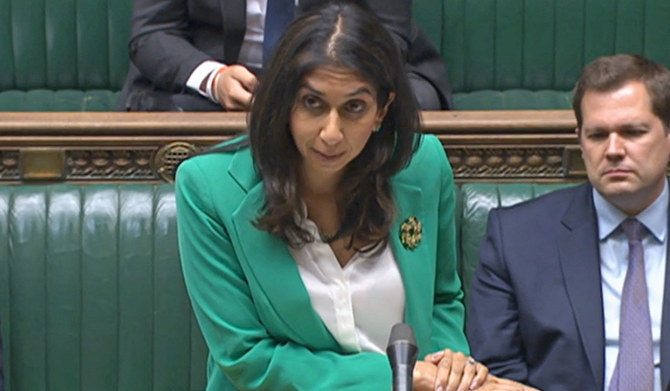LONDON: Britain is to ban Russian mercenary outfit the Wagner Group as a terrorist organization, media reports said on Tuesday, quoting Home Secretary Suella Braverman.
The UK was set to make the Wagner Group a “proscribed” organization under anti-terror laws, putting it on a par with Islamic State and Al-Qaeda, a report in the Daily Mail said.
“Wagner is a violent and destructive organization which has acted as a military tool of Vladimir Putin’s Russia overseas,” the newspaper quoted Braverman as saying.
“While Putin’s regime decides what to do with the monster it created, Wagner’s continuing destabilising activities only continue to serve the Kremlin’s political goals.”
Under the Terrorism Act 2000 the home secretary has the power to proscribe an organization if they believe it is involved in terrorism.
A proscription order makes it a criminal offense to support the group.
“They are terrorists, plain and simple — and this proscription order makes that clear in UK law,” a BBC report added, quoting the minister.
“Wagner has been involved in looting, torture and barbarous murders,” Braverman added in the Daily Mail.
The group’s operations in Ukraine, the Middle East and Africa “are a threat to global security,” she said.
“That is why we are proscribing this terrorist organization and continuing to aid Ukraine wherever we can in its fight against Russia.”
Draft measures to ban the Wagner Group under the act will be laid in Parliament on Wednesday, the reports said.
In July, Britain announced sanctions against 13 individuals and businesses it said had links to the Russian group in Africa, accusing it of crimes there including killings and torture.
The people and entities targeted — which are no longer able to deal with UK citizens, companies and banks, and have any UK assets frozen — were allegedly involved in Wagner’s activities in Mali, Central African Republic (CAR) and Sudan.
They included the purported head of Wagner in Mali, Ivan Aleksandrovitch Maslov; its chief in CAR, Vitalii Viktorovitch Perfilev; and the group’s operations head there, Konstantin Aleksandrovitch Pikalov.
Wagner founder Yevgeny Prigozhin, who died last month in a plane crash, had already been sanctioned by Britain alongside several of his key commanders who had participated in Russia’s war in Ukraine.
Prigozhin — a Kremlin confidant turned “traitor” — died two months after ordering his troops to topple Russia’s military leadership.




























